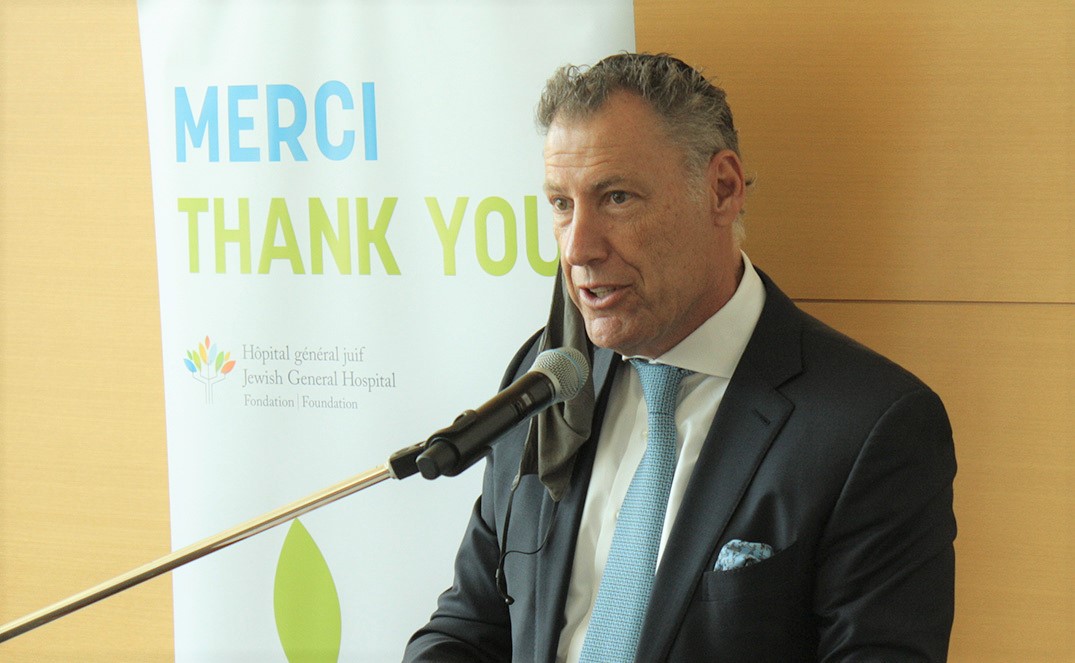The Jewish General Hospital (JGH) has opened a facility dedicated to improving care for the growing number of elderly patients, made possible by a major donation from community philanthropists.
The Susan and Aron Lieberman Family Wellness in Aging Centre is nearly triple the size of the previous geriatrics clinic, which dated back 40 years.
Like the previous clinic, the new centre is located on the ground floor of Pavilion E, just inside the Légaré Street entrance.
With the additional space the number of examination rooms has increased from four to 10.
“This means that more patients can be seen quickly and simultaneously, not only by a geriatrician, but by a variety of healthcare professionals who can provide a rapid assessment. This substantially cuts waiting times and makes scheduling more efficient,” said Dr. Ruby Friedman.
The centre has four main areas: a clinic for general care, a memory clinic, an oncology clinic, and a mobility clinic where gait and movement are assessed.
Friedman, associate director of geriatrics who has been on staff in the JGH Division of Geriatrics since 1985, said he put a great deal of thought into choosing the name Wellness in Aging.
“It suggests that the overarching mission is not just to treat illness, but to help each elderly person to maintain an optimum level of health and autonomy that is appropriate for their particular condition and circumstances.”
The Liebermans’ children and their spouses—Ben and Nadine Lieberman, Helene and David Donath, Lorne and Chaya Lieberman, and Marty and Renee Lieberman—underwrote the project, with support from the Aron and Susan Lieberman Foundation and the Jewish General Hospital Foundation.
At the dedication, Marty Lieberman said, “We now have a unique opportunity to give back to this world-class institution.
“Our aim is to help the elderly who are vulnerable, to raise their spirits and help them live a longer and healthier life.”
The centre’s design accentuates brightness, airiness and colour, which are intended to have a calming and reassuring effect on patients and their families.
Care has been taken to protect privacy, not only during examinations, but also in preliminary sessions when a nurse checks the patient’s vital signs and gathers other basic information.
To help patients orient themselves, the main corridor is illuminated by vertical lighting strips on the walls, as well as ceiling fixtures.
Each of the two nursing evaluation rooms contains a scale that can weigh a patient seated in a wheelchair.
A small nook has been added in the enlarged reception area where patients and their companions can make a complimentary cup of herbal tea. The reception has several chairs with higher seats for those who have mobility problems, placed well enough apart to aid infection control.
Space has also been allocated for research, which was not easily conducted in the previous facility.
Dr. Lawrence Rosenberg, president and chief executive officer of CIUSSS West-Central Montreal, the regional health authority that administers the JGH, expressed gratitude for the Lieberman family’s recognition of the needs of an aging population.
The JGH has been treating a disproportionately high number of elderly patients for decades, which has made it a leader in geriatric medicine and research. Harvey Levenson, chair of the JGH board of directors, concurred. “There cannot be enough words to say thank you for something that this hospital needed and the people of Quebec needed.”
Riva Hecht knows first-hand how true that is. She has been bringing her 91-year-old husband Thomas to the JGH for care of his Alzheimer’s disease since the 1990s.
“A bigger centre was certainly needed, and this one is much more welcoming, much more efficient and so airy,” she said. “It’s so much easier on me and on him, too, because mobility can be a problem. The care has always been excellent, and now it also feels warmer, with the big TV and the poppies on the wall in the reception area.”
Friedman hopes the new centre will encourage more medical students and other healthcare trainees to consider a career in geriatrics, which tends to be less attractive than other specialties.
“The motivation that they need is right here. All they have to do is look around to see how serious we are about devoting funds, space and professional expertise to a field that will touch all of our lives someday.”







